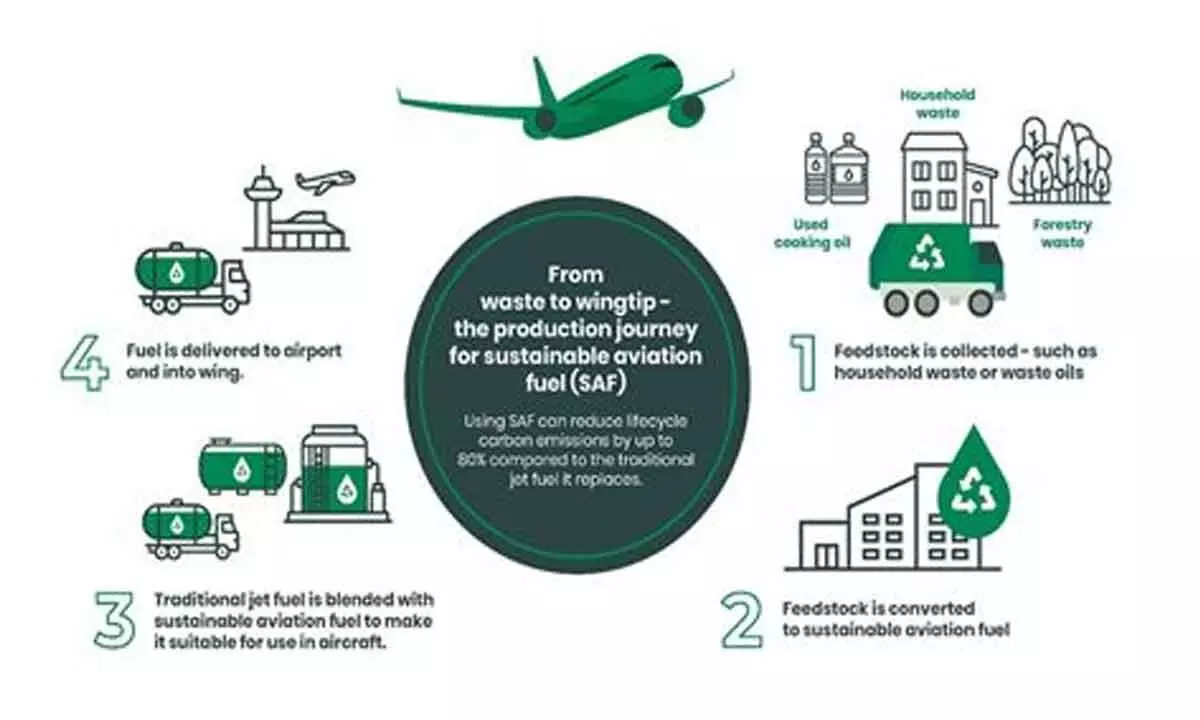SAF gas turbines are the way forward for aviation
image for illustrative purpose

Decarbonizing air transportation is a critical issue for the future of Indian industry. It notably rests on an increased use of Sustainable Aviation Fuel (SAF), along with leveraging other steps such as renewing the fleet with better fuel-saving and quieter aircraft, and rolling out eco-piloting-driven targeted operational measures. Production cannot yet keep up with the growing demand. It will take time to solve the inventory issue as an SAF production plant requires up to seven years before it can become fully operational. Also, some technologies like synthetic fuels are still at the development stage and are not ready for industrial implementation. Given the absence of an established production industry, SAF currently costs four to eight times more than convention fuel, a factor that is impacting airlines financially.
As a remedial measure, Airbus, a French company, is working to develop and put into service the world’s first hydrogen-powered commercial passenger aircraft by 2035. In close cooperation with its partners, Airbus will factor in aviation's requirement for hydrogen in New Zealand. Using its hydrogen hubs at airports concept, Airbus will engage with aviation and non-aviation players to perform a complete assessment of energy supply needs to enable the operation of hydrogen powered aircraft.
A consortium is bringing together a number of pioneering partners with a common interest to make it a reality. The hydrogen market has strong potential in terms of sustainable aviation and could account for 38% of all aircraft by 2050, according to McKinsey . Thanks to its ability to reduce CO2 emissions, diminish noise pollution and exploit renewable energy sources, hydrogen is increasingly seen as a promising alternative to fossil fuels. Many players like Airbus and Alaska Airlines have invested in research and development to design hydrogen solutions, which will reach the market over the coming years. Hydrogen fuel cells create electrical power that complements the gas turbine, resulting in a highly efficient hybrid-electric propulsion system. All of these technologies are complementary, and the benefits are additive.
In 2022, Airbus launched ZEROe demonstrator in order to test hydrogen combustion technology on an A380 multimodal platform. Through future ground and flight testing, it is expected to achieve a mature technology readiness level for a hydrogen-combustion propulsion system by 2025. Two hybrid-hydrogen turboprop engines, which drive eight-bladed propellers, provide thrust. The liquid hydrogen storage and distribution system is located behind the rear pressure bulkhead. While hydrogen can also be used directly as a fuel in a gas turbine, it is likely to start in the shorter haul segments, where the aircraft range is shorter. Given volume limitations attached to the storage of hydrogen and the limited power density of fuel cells, for long range, SAF fuelling gas turbines will remain the most likely solution moving forward. Hydrogen will offer options in shorter range segments and has the potential to progress onto larger segments, as the technology is proven and hydrogen fuel becomes more readily available. To support this, companies are investigating the feasibility of hydrogen-burning gas turbine engines, whilst continuing to promote SAF as the more mature technology.

